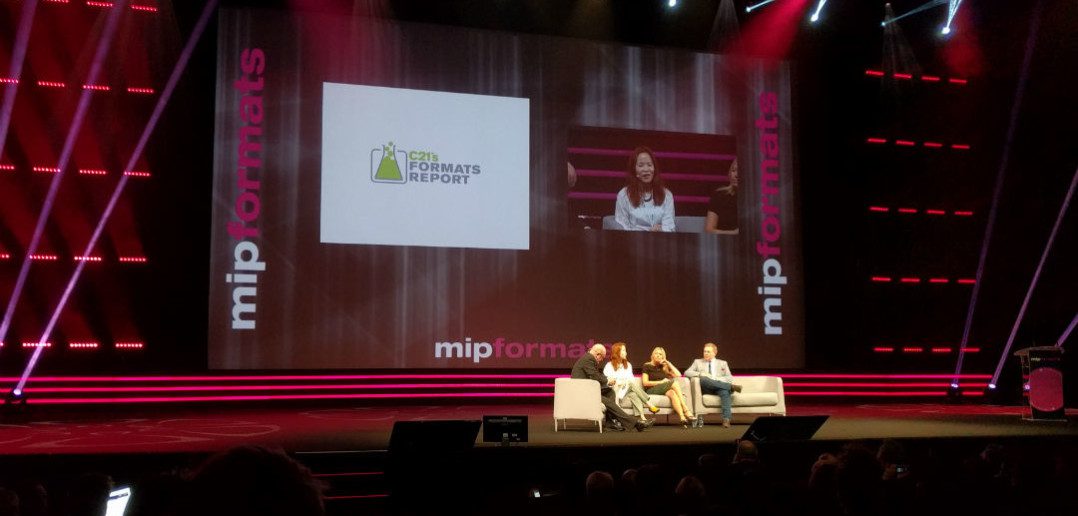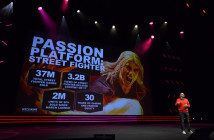The boom in binge-watchable drama, whether on traditional TV networks or SVOD services like Netflix, is causing some soul-searching for the factual and entertainment sector. This, at least, was one of the key themes from C21 Media’s Format Trends Analysis session at MIPFormats this afternoon.
The session drilled down into three countries – the UK, Holland and South Korea – using data gathered for C21’s latest global formats report. MD and editor-in-chief David Jenkinson was joined on the Grand Audi stage by SBS‘ producer/manager of global production Insoon Kim; Talpa Global‘s MD of new media Kim Dingler; and ITV‘s EVP of global development and formats Mike Beale, to chew over the trends.
Starting with South Korea, with a list of the five big format successes of 2015: Genius Game, Grandpas Over Flowers, Where Are We Going Daddy?, Running Man, and I Can See Your Voice. Meanwhile, five formats in 2016 that are creating a buzz are Look What Your Hubby Did, Mom Say Teen Say, Crime Scene, You Will Love Me, and Fantastic Duo.
Trends in Korea include « cooking shows with a twist », the importance of China for ‘K-Format’ exports – but also concern about a brain drain of format developers and producers to China – and independent Korean producers trying to wrest back rights from the networks, which Jenkinson noted is a trend elsewhere too.
SBS’ Kim agreed on the cooking point. « Even cooking shows are evolving. They’re combining with talk-shows or with the travel aspect, » she said. Kim also acknowledged the China issues. « We still believe in the power of Korean creators who want to stay in Korea,” she said. “But I know there are concerns.”
Later in the session, she talked about South Korea facing « a really chaotic era of content… I think it’s an era of chaos in Korea » but suggested that for creative minds in the country’s TV industry, this is an opportunity rather than something to grumble about. “The one who sets the new trend will be the champion,” she said. “My boss says it’s a challengers effect versus champions syndrome. It’s going to be a big fight in 2016 in Korea.”
As for Holland, the five most successful new formats in 2015, according to C21’s survey, were The Eureka Moment, Dance Dance Dance, Battle on the Dance Floor, The Wishing Tree and The Bully Project. Meanwhile, five formats tipped for big things in 2016 were SOS Survival of the Sexes, What The…?! Undressed, It Takes 2, and Back2School.
Talking points in the Dutch industry include the consolidation of local format companies; deep budget cuts and downsizing in the broadcast sector; growing internationalisation of formats; fewer « purely Dutch » formats on local broadcasters’ schedules – although neither Jenkinson nor Talpa’s Dingler knew exactly what a purely-Dutch format was – and mutterings about the lack of big, breakout new factual and entertainment formats in 2015.
“I sense a trend on factual. There are very many highly-emotional programmes coming across,” said Dingler, citing the example of a show about going on a trip with people who are dying. “There is something there, I don’t know if this is a real trend yet, but we sense it.” However, she had sharper words for formats like naked-dating show Undressed and sea-survival show The Raft: « I could sense these shows are more marketing ideas… but do they make great TV shows with longevity? I doubt it.”
Dingler said that one way out of some of the gloom in the Dutch market is technological innovation. « There is a problem in Holland. The solution is to go for more connected formats where you can go across multiple screens,” she said.
Later, she returned to the idea of « trying to reach people across different screens » before predicting that new technologies like virtual-reality headsets may spark a new wave of invention from producers. « What are shows going to do with VR? » she wondered. « One of the biggest fears is technological failure… but y’know, you’ve got to do it”. Producers and broadcasters may be scared of experimental new technology blowing up in their faces, but that is not an excuse not to experiment.
On to the UK. Jenkinson listed the big new formats of 2015 according to C21’s survey: Hunted, The Secret Life of 4 Year Olds, Gogglesprogs, Tattoo Fixers; and Young, Free and Single. As for those expected to do well in 2016: Drive; Come Dine: Champion of Champions; For What It’s Worth; Have a Nice Stay; and The Last Hours of Laura K.
Trends included an increased emphasis on casting – people want to watch « people they like » in factual and entertainment shows, as Great British Bake Off has proved – as well as authenticity being key. The survey also identified a spike in spin-off shows from motoring and dating formats.
However, the UK is also at the forefront of some of the more worrying trends for factual and entertainment, including the boom in high-quality drama – and the knock-on effects on non-scripted content. « We’re seeing drama taking what were entertainment or non-scripted slots, so there’s fewer slots for new [factual]shows, » he said.
Beale said that factual and entertainment formats aiming for primetime are now a rarity. “We’re seeing the tried-and-tested formats continue, and that’s why it’s hard to break in, and we’re probably seeing smaller fact and ent formats succeed, because that’s where the room is, » he said, citing Bake Off again, which began on BBC2 before graduating to BBC1. « That’s what formats need going forward. They need time to breathe and to find an audience.”
The conversation turned to global trends, including the boom in binge-watching – whether on catch-up services of broadcasters, or SVOD platforms like Netflix. There are concerns about factual and entertainment being squeezed from both sides: the drama surge means less slots on terrestrial, but also perhaps less time from viewers for non-scripted TV, wherever or however they watch.
Beale said that catch-up viewing has other effects: ITV2’s Love Island show had average ratings for its transmission, but did very well once catch-up and SVOD figures for its young audience were totted up. « They weren’t necessarily in at 9 o’clock every night, so they were catching up for that water-cooler moment the next day… We have to look at how we measure audience in a different way, » he said.
With investment in drama increasing, budgets for factual and entertainment shows are shrinking, agreed all the panellists. Beale looked on the positive side.
“I think it will make us more creative. We’ll get more creative and interesting ideas as we have to work within a budget. We can’t just make bigger sets and get more celebrities, » he said. SBS, meanwhile, is also looking for creative ideas – including new twists on familiar formats. Kim cited the example of a dating show with non-celebrities, in a market keenly focused on A-list talent. « We’re going back to classic, and at the same time we’re trying really new things with the combining with technology, » she said.
The session ended with a question about whether the game-show genre is in trouble, with only a handful of the 30 formats spotlighted by the C21 survey in these three countries counting as game-shows. Beale said that ITV continues to launch new ones, but tends to position them for daytime viewing rather than primetime, where they can build an audience and then move up later.
« It’s very hard for channels to launch a quiz into primetime. Giving away a million pounds today doesn’t move the dial. Just making it £10m doesn’t move the dial, » he said. Meanwhile, a question about what broadcasters can learn from mobile games – cue a now-traditional reference to Angry Birds – spurred Beale and Dingler to reveal that Talpa and ITV are co-developing a new game-show that will have some form of mobile gaming element. Neither would give any more details: perhaps that’s one for MIPCOM 2016.
During the session, C21 Media tweeted out some other findings from its formats survey. You can find them here, here and here.




